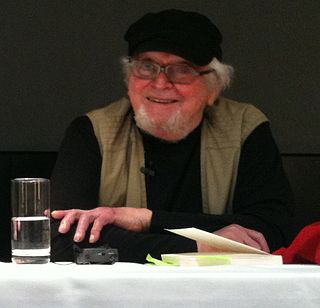A Quote by Russell Hoban
The first thing I would say to young writers is, "Don't do it, unless you can't stand not to do it." And the second thing I would say is, "If you do do it, and get into it, the constant rule you should have in mind is to explore your material." It sounds simple, but it isn't, because people often want to get from A to B, and they don't stop to look at what is in the material.
Related Quotes
Your only guidepost is your own instinct and judicious editing. In my stand-up act I learned that in the first 10 minutes I could say anything and it would get a laugh. Then I'd better deliver. In the movie it's the same thing. You get a lot of laughs when people first sit down and then the story better kick in. Many years in front of an audience, I would hope, give me a sense of what works.
People ask me often [whether] the Nobel Prize [was] the thing you were aiming for all your life, and I say that would be crazy. Nobody would aim for a Nobel Prize because, if you didn't get it, your whole life would be wasted. What we were aiming at was getting people well, and the satisfaction of that is much greater than any prize you can get.
Comedy is a weird thing. You have to understand, it's the weirdest thing you can do. There's no consensus. It's not like... People say, "I saw Saving Private Ryan, and that scene on the beach is just so moving." I can't imagine anyone who would say "I don't find that moving!" But you can show, whether it's Laurel & Hardy or the Three Stooges or Jiminy Glick In Lalawood, some people are going to look at it and say "That's the funniest thing I've ever seen." Some people will say "I don't get it." Who's right, who's wrong?
People who think they have no belief quite often say they want to pray but they do not know who or what they could be praying to. Aquinas would not say to such people, 'Ah, but you see, if you became a believer, a Christian, we would change all that. You would come to understand to whom you are praying.' Not at all. He would say to such people, 'If you became a Christian you would stop being surprised or ashamed of your condition. You would be happy with it. For faith would assure you that you could not know what God is until he reveals himself to us openly.'
When people say "Let it go," what they really mean is "Get over it," and that's not a helpful thing to say. It's not a matter of letting go - you would if you could. Instead of "Let it go," we should probably say "Let it be"; this recognizes that the mind won't let go and the problem may not go away, and it allows you to form a healthier relationship with what's bothering you.
I think the most important thing is just to write. It sounds so simple, but sometimes it's not. You can get so distracted - -by having to work other jobs, or what other people have to say about your writing - -but the one thing that really matters is that you just keep going, especially when you're working on a novel. It's so easy to get discouraged and give up.
When I first started out in comics they would put me on these Women of Marvel panels, and these young women would come up to me and say, "I really want to write comics but I don't know if I can because I'm told that it's just for guys." I would say, "That's bullshit. That's absolute bullshit. Look at me!" But the one area where we still need to work on is that we need more women of color. That's not common thing yet.
Here's what I advise any young struggling actress today: The important thing is to develop as a woman first, and a performer second. You wouldn't prostitute yourself to get a part, not if
you're in the right mind. You won't be happy, whatever you do, unless you're comfortable with your own conscience.
When I was in college, I remember thinking to myself, this internet thing is awesome because you can look up anything you want, you can read news, you can download music, you can watch movies, you can find information on Google, you can get reference material on Wikipedia, except the thing that is most important to humans, which is other people, was not there.
Someday, one of your friends is gonna get divorced, it's gonna happen, and they're gonna tell you. Don't go, 'ohhhh I'm sorry.' That's a stupid thing to say. First of all you're making 'em feel bad for being really happy, which isn't fair. And second of all: divorce is always good news. I know that sounds weird, but it's true, because no good marriage has ever ended in divorce. It's really that simple.
One of the things I noticed about the Trump supporters was a lot of projected fear. I can't tell you how many times a conversation went like this: "We've got to stop these immigrants, because it's terrible." I'd say, "Okay, what personally have you observed about this?" And there would be basically nothing in that box. And I'd say, "Where'd you get your information?" thinking they were going to say Fox. But they would always say, "Well, I get my information from all kinds of sources." Fox is kind of center-left to a lot of people now.
I had to leave some traces. In the beginning, I would give complete instructions to the photographer. In the '70s, people would come to photograph your work and you would just end up with this crazy material that had nothing to do with your work; maybe I'd pick up two or three photographs that were the closest to the idea. This is why when you look at the '70s, you see much less documentation and really bad material. The material will become misleading to what the piece was.
I would hate to say as a non-African-American person that it would be wrong for a black person to direct white people in a movie. Wouldn't that be awful of me to say that? The only sympathizing thing I might say for people that want to [grumble] is that a filmmaker should have an understanding for the place where the people you're portraying are coming from.





































